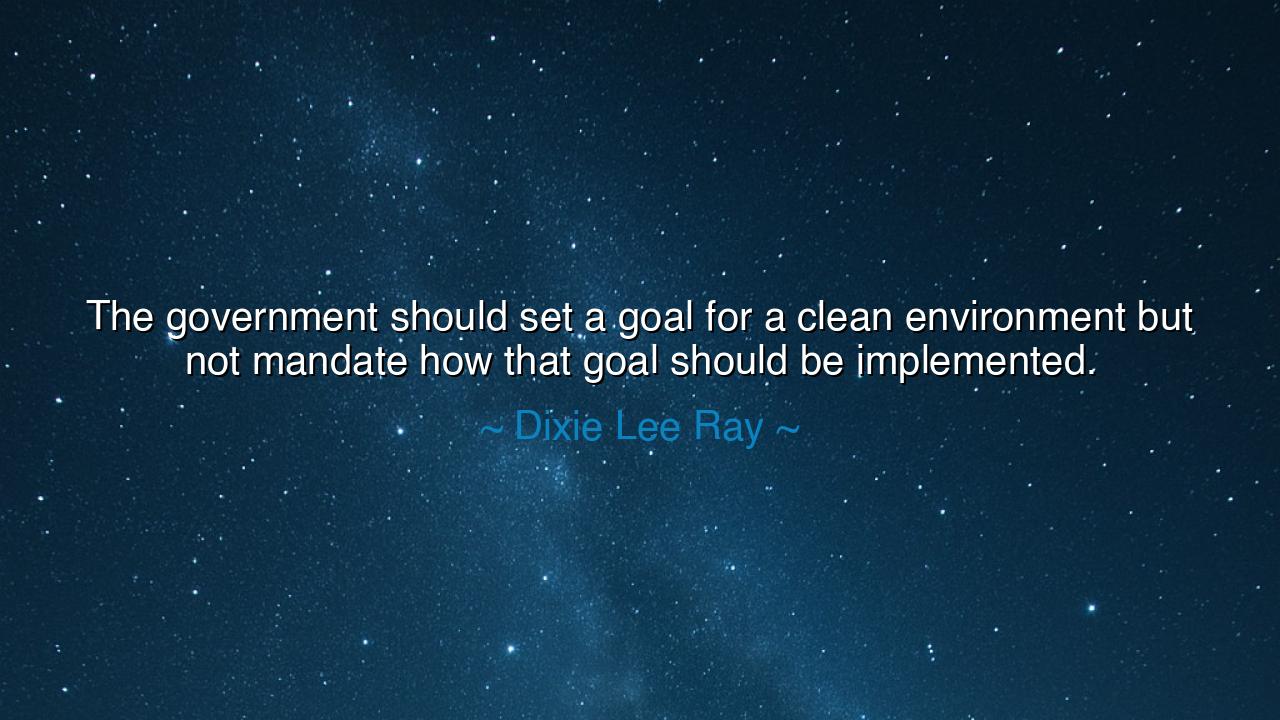
The government should set a goal for a clean environment but not
The government should set a goal for a clean environment but not mandate how that goal should be implemented.






In the twilight of the twentieth century, amid the rising clamor of industrial progress and the growing cry for the earth’s protection, Dixie Lee Ray—scientist, governor, and guardian of reason—spoke words that shimmer with timeless wisdom: “The government should set a goal for a clean environment but not mandate how that goal should be implemented.” In her words lies a philosophy both humble and profound, one that calls for balance between the hand that guides and the mind that creates. For she saw what many forget—that progress and protection must walk together, not as master and servant, but as equals in the great journey of civilization.
To set a goal is to declare vision; to mandate the path is to chain innovation. Ray, born of the scientific spirit, understood that the quest for a clean environment is not achieved by decree, but by the awakening of human ingenuity. The government, she believed, must light the beacon on the hill, showing the way toward purity of air and water, but it must not bind every craftsman’s hand nor dictate the tools by which that vision is reached. For freedom is the fertile soil in which solutions grow; and when the state prescribes every step, creativity withers like a plant starved of sun.
This teaching finds echoes in the wisdom of the ancients. When the philosopher Aristotle spoke of governance, he warned that the laws of men must serve the nature of man, not confine it. “The law,” he said, “is reason free from passion,” and in that spirit, Ray’s words remind us that true governance inspires rather than constrains. The ruler who declares an end worthy of pursuit but trusts his people to find the means honors both liberty and intellect. But the ruler who dictates every method becomes not a guide but a tyrant, mistaking control for wisdom.
History itself offers testimony. In the early days of the American environmental movement, the nation faced poisoned rivers, smog-choked skies, and the haunting echo of Rachel Carson’s Silent Spring. The Clean Air Act and Clean Water Act were born, noble in purpose, sweeping in scope. Yet it was not government alone that restored the balance of nature—it was the inventors, the engineers, the farmers, and the citizens who took the challenge into their own hands. Factories reimagined their processes, scientists forged cleaner technologies, and communities rose to heal what greed had scarred. The goal was set by the state, but the path was paved by the people. Thus was proven Ray’s belief: that guidance, not domination, leads to lasting change.
And yet, her words are not a dismissal of responsibility. Dixie Lee Ray did not say the government should stand idle; she said it should lead by principle, not by prescription. To set a goal for a clean world is an act of leadership; to trust the minds of the nation to achieve it is an act of faith. It is to recognize that wisdom does not dwell solely in the halls of power, but also in the laboratories, the fields, the homes, and the hearts of the people. This faith in shared stewardship is the essence of democracy itself—an agreement that all may contribute to the good, each in their own way, guided by the light of a common purpose.
In these words there is also a warning for future generations. Beware of the arrogance that believes salvation can be commanded into being. The Earth does not yield to edicts, nor does progress flourish beneath bureaucracy’s weight. The clean environment that Ray envisioned will come not from the letter of regulation, but from the spirit of responsibility awakened within every soul. The shepherd may point toward the green valley, but it is the flock that must walk there, step by step, with eyes open and will unbroken.
So let this lesson endure: set your goals high, but leave the path open for discovery. In your work, in your governance, in your stewardship of this fragile world, remember that freedom and responsibility are sisters who must never be parted. Leaders should inspire, not dictate; citizens should act, not wait. Each of us bears the duty to keep the Earth pure and the air clean—not because the law compels us, but because conscience commands us.
And thus we hear the wisdom of Dixie Lee Ray echo across the ages: A good government is the compass, not the chain. It shows direction but does not restrain movement. Let each generation, then, take up the call to protect the Earth with ingenuity, courage, and reverence. For the greatest act of governance is not to control the hands of the people, but to awaken their hearts to the care of the world they share.






AAdministratorAdministrator
Welcome, honored guests. Please leave a comment, we will respond soon